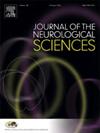IF 3.6
3区 医学
Q1 CLINICAL NEUROLOGY
引用次数: 0
摘要
背景非复发性髓鞘少突胶质细胞糖蛋白抗体相关疾病(nr-MOGAD)是一种中枢神经系统炎症性脱髓鞘疾病,经常影响年轻人群。目的 研究 nr-MOGAD 患者与复发性多发性硬化症(pwRRMS)患者和健康对照组(HCs)相比的认知概况和认知纵向变化。方法对 8 名 nr-MOGAD 患者、32 名 pwRRMS 患者和 22 名健康对照者进行基线评估和为期 12 个月的随访评估,并使用神经心理学测试简易可重复电池(BRBN)和 Stroop 测试进行评估。结果在基线时,nr-MOGAD 患者表现出中度认知缺陷,尤其是在言语记忆和处理速度领域,其得分介于 pwRRMS 和健康对照者之间。结论 nr-MOGAD 的认知障碍模式与 pwRRMS 的认知障碍模式不同,尤其是在年轻患者中,与 pwRRMS 不同的是,nr-MOGAD 的认知障碍模式经常发生逆转,而 pwRRMS 的认知障碍模式则更常见。本文章由计算机程序翻译,如有差异,请以英文原文为准。
Longitudinal assessment of cognitive function in patients with non-relapsing MOG-IgG associated disease
Background
Non-relapsing myelin oligodendrocyte glycoprotein antibody-associated disease (nr-MOGAD) is an inflammatory demyelinating disorder of the central nervous system that frequently affects younger populations. The longitudinal impact of nr-MOGAD on cognitive function remains poorly characterized.
Objectives
To investigate cognitive profiles and longitudinal cognitive changes in patients with nr-MOGAD compared to individuals with Relapsing-Remitting Multiple Sclerosis (pwRRMS) and healthy controls (HCs).
Methods
A cohort of 8 nr-MOGAD patients, 32 pwRRMS patients, and 22 HCs underwent a baseline and a 12-month follow-up assessment with the Brief Repeatable Battery of Neuropsychological Tests (BRB![]() N) and Stroop test.
N) and Stroop test.
Results
At baseline, nr-MOGAD patients exhibited moderate cognitive deficits, particularly in verbal memory and processing speed domains, with scores intermediate between pwRRMS and HCs. At follow-up, nr-MOGAD patients, especially those with pediatric-onset, showed significant cognitive recovery, contrasting with the stable impairments observed in pwRRMS.
Conclusions
Cognitive impairment patterns in nr-MOGAD are distinct from those observed in pwRRMS and, particularly in younger patients, show a frequent reversal unlike pwRRMS, in which persistently impaired cognitive performances are much more common.
求助全文
通过发布文献求助,成功后即可免费获取论文全文。
去求助
来源期刊

Journal of the Neurological Sciences
医学-临床神经学
CiteScore
7.60
自引率
2.30%
发文量
313
审稿时长
22 days
期刊介绍:
The Journal of the Neurological Sciences provides a medium for the prompt publication of original articles in neurology and neuroscience from around the world. JNS places special emphasis on articles that: 1) provide guidance to clinicians around the world (Best Practices, Global Neurology); 2) report cutting-edge science related to neurology (Basic and Translational Sciences); 3) educate readers about relevant and practical clinical outcomes in neurology (Outcomes Research); and 4) summarize or editorialize the current state of the literature (Reviews, Commentaries, and Editorials).
JNS accepts most types of manuscripts for consideration including original research papers, short communications, reviews, book reviews, letters to the Editor, opinions and editorials. Topics considered will be from neurology-related fields that are of interest to practicing physicians around the world. Examples include neuromuscular diseases, demyelination, atrophies, dementia, neoplasms, infections, epilepsies, disturbances of consciousness, stroke and cerebral circulation, growth and development, plasticity and intermediary metabolism.
 求助内容:
求助内容: 应助结果提醒方式:
应助结果提醒方式:


